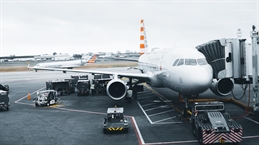
The travel ban that US President Donald Trump recently announced on travels from the European Union (EU) will not affect cargo operations according to the White House.
The US is suspending European travels to the US for 30 days, starting Friday midnight (March 13), in an effort to prevent more cases of the infection from entering the US soil.
The new travel restriction to the European Union does not apply to the United Kingdom, Ireland and other non-Schengen countries.
"To keep new cases from entering our shores, we will be suspending all travel from Europe to the United States for the next 30 days. The new rules will go into effect Friday at midnight," President Trump said on his speech Wednesday night.
He added: These prohibitions will not only apply to the tremendous amount of trade and cargo but various other things as we get approval. Anything coming from Europe to the United States is what we are discussing.
In a factsheet released by the White House shortly, it clarified that the proclamation under section 212(f) of the Immigration and Nationality Act (INA) to restrict travel to the United States from foreign nationals who have recently been in certain European countries does not affect cargo.
"Section 212(f) of the INA only applies to the movement of human beings, not goods or cargo," the White House fact sheet read.
President Trump also repeated the message on Twitter saying cargo will not be affected.
"Very important for all countries & businesses to know that trade will in no way be affected by the 30-day restriction on travel from Europe," he said. "The restriction stops people, not goods."
Although the travel ban is not likely to impact air cargo movements heavily, operators are still expected to feel a pinch as restrictions on passenger flights would also mean a reduction in belly-hold cargo capacity from the European market to the US.
The ban will last 30 days until April 12 subject to conditions on the ground.
Cost to the aviation industry
The International Air Transport Association (IATA) said separately that the economic fallout from the newest travel restriction "will be broad."
In 2019, there was a total of around 200,000 flights scheduled between the United States and the Schengen Area, equivalent to around 550 flights per day. There were around 46 million passengers (roughly equivalent to 125,000 travellers every day).
“Governments must impose the measures they consider necessary to contain the virus. And they must be fully prepared to provide support to buffer the economic dislocation that this will cause. In normal times, air transport is a catalyst for economic growth and development. Suspending travel on such a broad scale will create negative consequences across the economy. Governments must recognize this and be ready to support,” said Alexandre de Juniac, IATA’s Director General and CEO.
IATA said the US measures will add to this financial pressure in the already heavily-impacted industry with the total value of the US-Schengen market in 2019 at US$20.6 billion.
The markets expected to face the heaviest impact are US-Germany (US$4 billion), US-France (US$3.5 billion) and US-Italy (US$2.9 billion).



